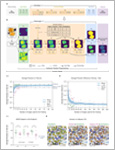An unresolved issue in contemporary biomedicine is the overwhelming number and diversity of complex images that require annotation, analysis and interpretation. Recent advances in Deep Learning have revolutionized the field of computer vision, creating algorithms that compete with human experts in image segmentation tasks. However, these frameworks require large human- annotated datasets for training and the resulting “black box” models are dif- ficult to interpret. In this study, we introduce Kartezio, a modular Cartesian Genetic Programming-based computational strategy that generates fully transparent and easily interpretable image processing pipelines by iteratively assembling and parameterizing computer vision functions. The pipelines thus generated exhibit comparable precision to state-of-the-art Deep Learning approaches on instance segmentation tasks, while requiring drastically smaller training datasets. This Few-Shot Learning method confers tremendous flex- ibility, speed, and functionality to this approach. We then deploy Kartezio to solve a series of semantic and instance segmentation problems, and demon- strate its utility across diverse images ranging from multiplexed tissue histo- pathology images to high resolution microscopy images. While the flexibility, robustness and practical utility of Kartezio make this fully explicable evolu- tionary designer a potential game-changer in the field of biomedical image processing, Kartezio remains complementary and potentially auxiliary to mainstream Deep Learning approaches.
Nature Communications , 2023, 14 7112.
Evolutionary design of explainable algorithms for biomedical image segmentation

